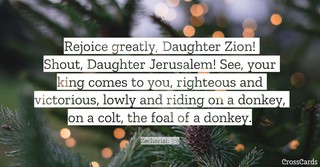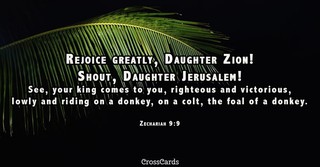
Change Translation
- Recent Translations
- All Translations
Zechariah 9:10
Share
Listen to Zechariah 9:10
Settings
Scripture Text Size
10
I've had it with war - no more chariots in Ephraim, no more war horses in Jerusalem, no more swords and spears, bows and arrows. He will offer peace to the nations, a peaceful rule worldwide, from the four winds to the seven seas.
Zechariah 9:10 Meaning and Commentary
Zechariah 9:10
not only the church of Christ, gathered out of the Jews, should enjoy great spiritual peace, prosperity, and safety; but the Gentiles also should share in it, to whom Christ went, and preached peace; not in his own person, being the minister of the circumcision: but by his apostles, who had the ministration of reconciliation committed to them; and being sent forth by Christ, went everywhere preaching peace by him, who is Lord of all, unto all nations; see ( Ephesians 2:17 ) : and his dominion [shall be] from sea [even] to sea, and from the
river [even] to the ends of the earth;
according to Aben Ezra, from the Red Sea to the sea of the Philistines, and from the river Euphrates to the ends of the earth: or, as Kimchi cites him, from the south sea, called the sea of Edom, to the north sea, which is the sea of the ocean; from the river that goes out from Eden, which is at the beginning of the east, unto the ends of the earth, which is the end of the west: or, as the Targum paraphrases it,
FOOTNOTES:
F9 R. Isaac, Chizzuk Emuna, par. 1. c. 1. p. 43, 44. So Kimchi in Isa. lxv. 19.
And I will cut off the chariot from Ephraim
That is, the military one; signifying that wars shall cease, ( Psalms 46:9 ) : and the horse from Jerusalem;
the warlike one; see ( Micah 5:10 ) . Ephraim designs the ten tribes, and Jerusalem stands for the two tribes of Judah and Benjamin; and the sense is, that these shall be one in the days of the Messiah, as Kimchi observes; and that all instruments of war shall be removed from them, and there shall be an entire peace between them; see ( Isaiah 11:13 ) ( Ezekiel 37:16 Ezekiel 37:19 ) : and the battle bow shall be cut off;
another instrument of war. The Targum paraphrases it,
``I will break the strength of those that make war, the armies of the people;''all this does not design so much the outward peace that should be in the world at the birth of Christ, as the spiritual peace of his kingdom; and that, as it is not of this world, so neither is it spread, supported, and defended by carnal weapons; and also the peaceableness and safety of his subjects, and the destruction of their enemies: and he shall speak peace unto the heathen;
not only the church of Christ, gathered out of the Jews, should enjoy great spiritual peace, prosperity, and safety; but the Gentiles also should share in it, to whom Christ went, and preached peace; not in his own person, being the minister of the circumcision: but by his apostles, who had the ministration of reconciliation committed to them; and being sent forth by Christ, went everywhere preaching peace by him, who is Lord of all, unto all nations; see ( Ephesians 2:17 ) : and his dominion [shall be] from sea [even] to sea, and from the
river [even] to the ends of the earth;
according to Aben Ezra, from the Red Sea to the sea of the Philistines, and from the river Euphrates to the ends of the earth: or, as Kimchi cites him, from the south sea, called the sea of Edom, to the north sea, which is the sea of the ocean; from the river that goes out from Eden, which is at the beginning of the east, unto the ends of the earth, which is the end of the west: or, as the Targum paraphrases it,
``from the sea to the west, and from Euphrates to the ends of the earth.''The phrases are expressive of the extensiveness of Christ's dominion, through the preaching of the Gospel, both in Judea and in the Gentile world, before the destruction of Jerusalem; and especially in the latter day; see ( Psalms 72:8 ) . This and the preceding clause are allowed to belong to the Messiah, by a modern Jewish writer F9.
F9 R. Isaac, Chizzuk Emuna, par. 1. c. 1. p. 43, 44. So Kimchi in Isa. lxv. 19.
Taken from John Gill's Exposition of the Bible
Unlock Deeper Insights: Get Over 20 Commentaries with Plus! Subscribe Now
Zechariah 9:10 In-Context
8
"I will set up camp in my home country and defend it against invaders. Nobody is going to hurt my people ever again. I'm keeping my eye on them. A Humble King Riding a Donkey
9
"Shout and cheer, Daughter Zion! Raise the roof, Daughter Jerusalem! Your king is coming! a good king who makes all things right, a humble king riding a donkey, a mere colt of a donkey.
10
I've had it with war - no more chariots in Ephraim, no more war horses in Jerusalem, no more swords and spears, bows and arrows. He will offer peace to the nations, a peaceful rule worldwide, from the four winds to the seven seas.
11
"And you, because of my blood covenant with you, I'll release your prisoners from their hopeless cells.
12
Come home, hope-filled prisoners! This very day I'm declaring a double bonus - everything you lost returned twice-over!
Published by permission. Originally published by NavPress in English as THE MESSAGE: The Bible in Contemporary Language copyright 2002 by Eugene Peterson. All rights reserved.
